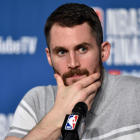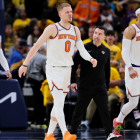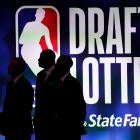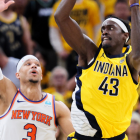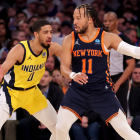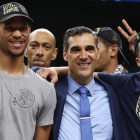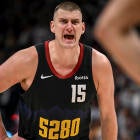Kevin Love signed a new deal with the Cleveland Cavaliers on Tuesday, extending his contract for a reported four years and $120 million. According to ESPN's Brian Windhorst, Love will make max money in 2019-20 and 20-21 and slightly less than that in 2021-22 and 2022-23. He turns 30 in September, which means that this runs through the end of his prime.
From Love's perspective, this is easy to understand. It's a hell of a lot of money, and it gives him the opportunity to be the No. 1 option for the first time since the 2013-14 season. His last four seasons with LeBron James have had wild ups and downs, and while he learned how to function as a complementary player -- and quietly had the most efficient season of his career last year -- he never fully got to be himself. Now, whether or not he finishes this contract in Cleveland, he will at least get to prove that he can still carry an offense … while being compensated handsomely.
If you are confused, it is probably because the Cavaliers are a rebuilding team and Love is a second-tier star. Surely, they are not delusional enough to think that they can build a championship team around him and Collin Sexton in the next five years. If that's not the plan, are they just making a big show of this to send a message to their fans? Is this about avoiding the perception that LeBron James' departure has ruined them? Have they decided to try to be competitive and make a run for the playoffs?
That would be a shortsighted decision, particularly because of the first-round pick Cleveland owes Atlanta from the Kyle Korver trade. The pick is top-10 protected in both of the next two years; after that, it will convey as two second-rounders. If the Cavs' main concern is building through the draft, then they should make sure they don't fall out of the top 10.
It is possible, of course, that Cleveland doesn't need to trade Love to be terrible. It was an atrocious defensive team last season, and it needed James to play all 82 games and be heroic in the clutch in order to finish with 50 wins, with the statistical profile of a 44-win team. Without James, the Love-led Cavs could be pretty good offensively and still be truly awful overall.
Any way you look at this, keeping Love is riskier long-term than moving him. He can't be traded for six months, but could be on the market again before February's deadline, Blake Griffin-style.
The question, of course, is just how much trade value Love will have. He has been available in trade talks on and off for several years, despite the fact he played a key role when Cleveland won a title in 2016. As wonderfully as he shoots the ball, as skilled as he is as a scorer, passer and rebounder, his weaknesses stand out in the playoffs: he's not a great rim protector and can't comfortably switch onto smaller players. The league has changed since he was a superstar with the Minnesota Timberwolves, and even if he shines the same way for a crappy Cavs team, it might not change his reputation all that much.
Clearly, Cleveland did not think any of its current trade options were better than extending him and looking around the league later. I get it: In the short term, he will provide structure for the team. Maybe he will be a more appealing trade target on this contract rather than a potentially expiring one. Any front office that acquires him, though, will have to be willing to pay him close to the max for quite a while. If you're going to do that, you better be confident that Love will take your team to the next level.
Perhaps the most likely scenario is Love playing out this season with the Cavs, reminding the world what he can do with the ball in his hands and then being traded into a team's cap space next July. Unlike this summer, a ton of teams are going to have room to reshape their rosters then, and not all of them will be able to sign a big-time free agent. Love could be a nice fallback plan, and Cleveland might be able to get some picks and/or young players in return.
Taking this road comes with an opportunity cost, though. What if Love gets hurt this season and no one wants him? What if he has a career year and the Cavs miss out on a chance to bottom out and select someone like R.J. Barrett or Cameron Reddish in the draft? As complicated as this situation might seem, sometimes the crux of the matter is simple: The longer Love stays in Cleveland, the less the two parties need each other.













